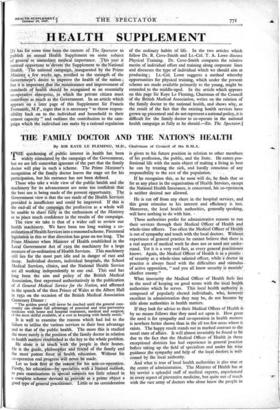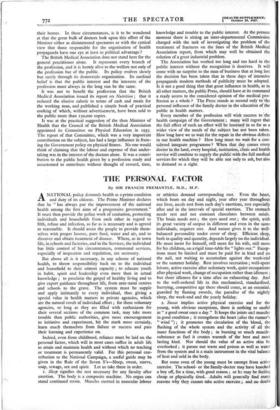H EALTH SUPPLEMENT
[IT has for some time been the custom of The some to publish in annual Health Supplement on some subject of general or immediate medical importance. . This year it seemed OppOrtune to devote the Supplement tothe National Health. The national campaign, inaugurated by the Prime Minister -a_ few weeks ago, testified to the strength of the Government's desire to imProve the health of the nation ; but it is important _that the 'Maintenance and improvement of standards ‘of health shOuld be recognised as an essentially co-operative enterprise, to which the private citizen must contribute as much as the Government. In an.article which appears on a later page of this Supplement Sir Francis Fremantle,M.P., urges that it is necessary " to throw respon- sibility back on to. the individual and household to their utmost capacity " and outlines the contribution to the cam- paign which the individual can make by a rational regulation of the ordinary habits of life. In the two articles which follow Dr. R. Cove-Smith and Lt.-Col. T. A. Lowe discuss Physical Training. Dr. Cove-Smith compares the relative merits of individual effort and training along corporate lines and discusses the type of individual which we should aim at producing ; Lt.-Col. Lowe suggests a method whereby opportunities for physical training, which under the present scheme are made available primarily to the young, might be extended to the middle-aged. In the article which appears on this page Sir Kaye Le Fleming, Chairman of the Council of the British Medical Association, writes on the relation of the family doctor to the national health, and shows why, as the result of the fact that the existing health services have grown up piecemeal and do not represent a national policy, it is difficult for the family doctor to co-operate in the national health campaign as fully as he should.—ED. The Spectator.] THE. FAMILY DOCTOR AND THE NATION'S HEALTH
By SIR KAYE LE FLEMING, M.D., Chairman of Council of the B.M.A.
T. quickening of public interest in _health has been widely stimulated by the campaign of the Government, but we are left somewhat ignorant of the part that the family doctor will play in such a scheme. The Prime Minister's recognition of the family doctor leaves the stage set for his participation, but his entrance has not been defined. • Those who take a wide view of the public health and the machinery for its advancement are none too confident that the best use is being made of the present opportunity. The Government view is that the use made of the Health Services provided is insufficient and could be impieVed. If this is the end-all of the campaign the profession as a whole will be unable to share fully' in the enthusiasm of the Ministry or to place much confidence in 'the results of the campaign.
The view we take is that of a wider call to review our health machinery. We have been too long waiting a co- ordination of Health Services into a reasoned scheme. Piecemeal legislation in this or that direction has gone on too long. The Prime Minister when Minister of Health established in the Local Government Act of 1929 the machinery for a large measure of co-ordination of Health Services. This machinery still lies for the most part idle and in danger of rust and decay. Individual doctors, individual hospitals, the School Medical Services, clinics, and the National Health Service are all working independently to one end. This end has long been the aim and policy of the British Medical Association, first expressed authoritatively in the publication of A General Medical Service for the Nation, and affirmed in the speech of the then Prince of Wales at the Albert Hall in 1932 on the occasion of the British Medical Association Centenary Dinner :
" The golden portal will never be reached until the general com- munity can obtain full advantage _of practical and wise preventive medicine with home and hospital treatment, medical and surgical, of the most skilful available, at a cost in keeping with family needs."
It is well to examine the reasons which had led to the failure to utilise the various services to their best advantage and to that of the public health. The more this is studied the more surely is the position of the family doctor in relation to health matters•eitablished as the key to the whole problem.
He alone is in Much with -the people in their homes. He is the guide, philosopher and- friend of the family and the most potent - force-- in- health education. Without his co-operation real progress Will never be made.
Let us look first at the reason for his non-co-operation. Firstly, his educatIon—by specialists with a limited outlook, to pass examinations in special subjects too little related in a complete scheme devised to, provide as a prime object a good type of general practitioner. Little or no consideration is given to his future position in relation to other members of his profession, the public, and the State. He enters pro- fessional life with the main object of making a living:as best he can by treating the sick, and hardly conscious of any responsibility to the rest of the population.
If he recognises this, as he soon will do, he finds that so far as any place in the organisation of Health Services, except the National Health Insurance, is concerned, his co-openthon is neither desired nor allowed.
He is cut off from any share in the hospital services, and this great stimulus to his interest and efficiency is lost. Moreover, the local health authorities, generally speaking, will have nothing to do with him. • These authorities prefer for administrative reasons to run their services through their Medical Officer of Health and whole-time officers. Too often the Medical Officer of Health is out of sympathy and touch with the local doctors. Without_ experience of general practice he cannot believe that there is a real aspect of medical work he does not or need not under- stand. Yet it is a very real fact, as every general Practitioner knows. Again, the Medical Officer of Health is in a pOsitio of security as a whole-time salaried officer, while a doctor in practice is always faced with the difficulties and stimulus of active opposition, " and you all know security is mortals' chiefest enemy."
What insecurity the Medical Officer of Health feels lies in the need of keeping on good terms with the local health authorities which he serves. This local health authority is composed of popularly elected individuals, whO, hoVievei excellent in administration they may be, do not become by title alone authorities in health matters. • If they look for advice to their Medical Officer of Health it by no means follows that they need act upon it. How great the need is for sympathy and co-operation in health matters is nowhere better shown than in the all too few areas where it exists. The happy result stands out in marked contrast to the usual state of affairs. It will almost invariably be found to be due to the fact that the Medical Officer of Health in these exceptional districts has had experience in general practice before taking up the field of specialism and under his wise guidance the sympathy and help of the local doctors is wet= corned by the local authority.
And what is true of local health authorities is also true at the centre of administration. The Minister of Health has at his service a splendid staff of medical experts, experienced in every aspect of preventive medicine, but quite out of touch with the vast army of doctors who alone know the people in their homes. In these circumstances, is it to be wondered at that the great bulk of doctors look upon this effort of the Minister either as disinterested spectators or with the cynical view that those responsible for the organisation of health propaganda have one eye at least to political advantage ?
The British Medical Association does not stand here for the general- practitioner alone. It represents every branch of the profession, and it is keenly alive to the welfare not only of the profession but of the public. Its policy evolves slowly but surely through its democratic organisation. Its cardinal belief is that the public interest and the -interests of the profession must always in the long run be the same.
It was not to benefit the profession that the British Medical Association issued its report on Nutrition ; that it reduced the elusive calorie to terms of cash and meals for the working man, and published a simple book of practical cooking of which, without advertisement, have been sold to the public more than 150,000 copies.
It was at the practical suggestion of the then Minister of Health that the Council of the British Medical Association appointed its Committee on Physical Education in 1935. The report of that Committee, which was a very important- contribution on the subject, has had a large influence in fram- ing the Government policy on physical fitness. No one would, think of claiming that the labour and expense of that under- taking was in the interest of the doctors alone. It was a contri-: bution to the public health given by a profession ready and. accustomed to contribute without thought of reward, time, knowledge and trouble to the public interest. At the present moment there is sitting an inter-departmental Commission charged with the task of investigating the problem of the treatment of fractures on the lines of the British Medical Association report, from which may well be obtained the solution of a great industrial problem.
The Association has worked too long and too hard in the public interest without the recognition' it -deserves. It will come with no surprise to the man of business that at long last the decision has been taken that in these days of intensive propaganda modern methods of publicity must be adopted. Is it not a good thing that that great influence in health, as in all other matters, the public Press, should have at its command a ready access to the considered opinion of the medical pro- fession as a whole ? The Press stands as second only to 'the personal influence of the fainily doctor in the education of the public in health matters. - Every member of the profession will wish success to the health campaign of the Governiment ; many Will regret that the full effect of such-an effort lessened in so far as a wider view of the needs of the subject has not been taken. How long have we to wait for the repair in the obvious defects in our health machine ) How long Must we wait-for a con- sidered integrate programme ? When that day. comes every doetor in land, every hospital, institution, clinic and health Service will combine to supply the public with the full medical services for which they will be able nof-only to ask, but also to demand - as- a right.



























































 Previous page
Previous page